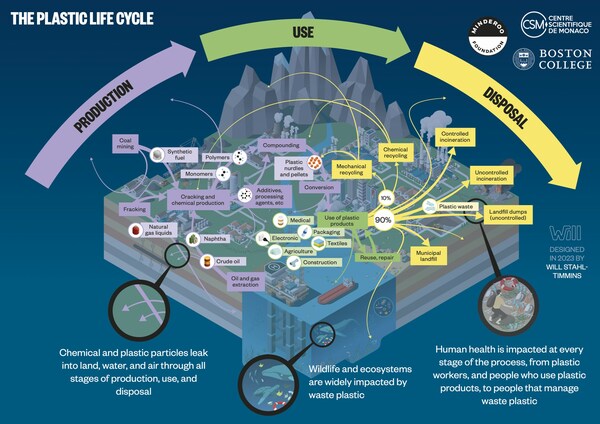MONACO, March 21, 2023 /PRNewswire/ -- The Minderoo-Monaco Commission on Plastics and Human Health presents a never-before-seen analysis realized with world-leading researchers from the fields of healthcare, the ocean and the environment to quantify plastic's considerable risks to all life on earth:
- Plastic causes disease, impairment, and premature mortality at every stage of its life cycle, with the health repercussions disproportionately affecting vulnerable, low-income, minority communities, children.
- Toxic chemicals that are added to plastic and routinely detected in people are known to increase the risk of miscarriage, obesity, cardiovascular disease, cancers.
- Plastic waste is ubiquitous in the ocean, on which we depend for oxygen, food and livelihoods, contaminating the water, the sea floor, entering the marine food chain.
To view the Multimedia News Release, please click:
https://www.multivu.com/players/uk/9150051-plastic-threatens-human-and-planetary-health/
The Commission concludes that current plastic production, use, and disposal patterns are not sustainable and are responsible for significant harm to human health, the environment, and the economy. It recommends establishing health-protective standards for plastic chemicals under the Global Plastics Treaty, requiring testing all polymers and plastics chemicals for toxicity before entering markets, as well as post-market surveillance.
Professor Sarah Dunlop, Head of Plastics and Human Health at Minderoo Foundation explains: "These findings put us on an unequivocal path to demand the banning or severely restricting of unnecessary, avoidable, problematic plastic items, many of which contain hazardous chemicals with links to horrific harm to people and the planet.»
Dr Philip Landrigan, Director of the Global Observatory on Planetary Health at Boston College is particularly concerned about the lack of progress made by regulators. "Very few details about the identity, chemical makeup, potential toxicity of plastic chemicals are disclosed by plastic producers. In most countries, they are under no legal obligation to do so."
Regarding marine biology, the Commission's findings reveal a greater need for measurement of the effects of plastic on marine species, especially concerning the ingestion of micro and nano particles.
Dr Hervé Raps, Physician at Centre Scientifique de Monaco, explains "Plastic waste endangers the ocean ecosystems upon which all humanity depends. Besides their intrinsic effects, plastics can also be a vector for potentially pathogenic microorganisms."
The positive news is that the Commission reports that many of plastics' harms can be avoided via better production practices, alternative design, less toxic chemicals, decreased consumption.
Centre Scientifique de Monaco
Thierry Apparu
Email: thierry@tapcommunication.com











